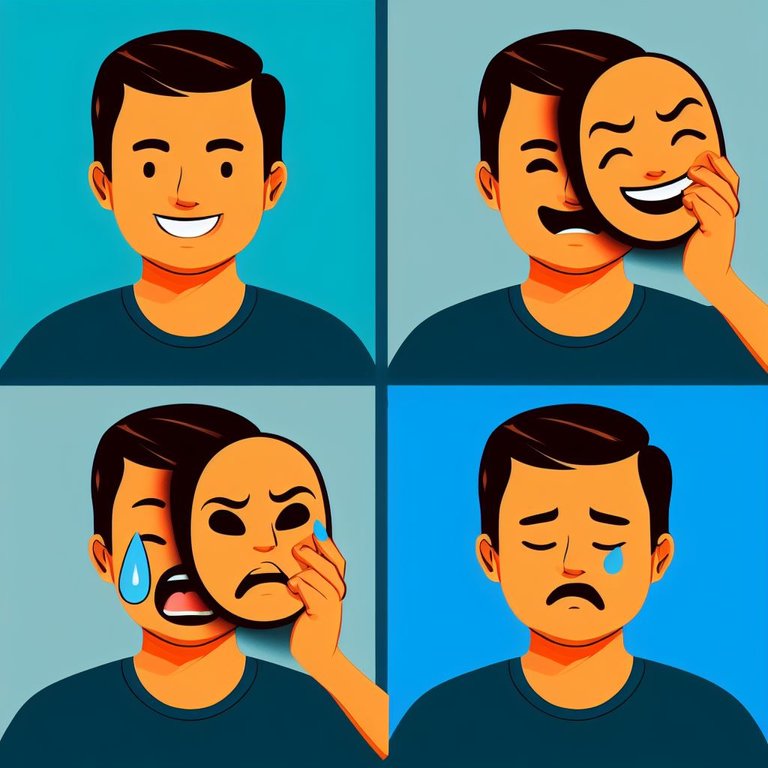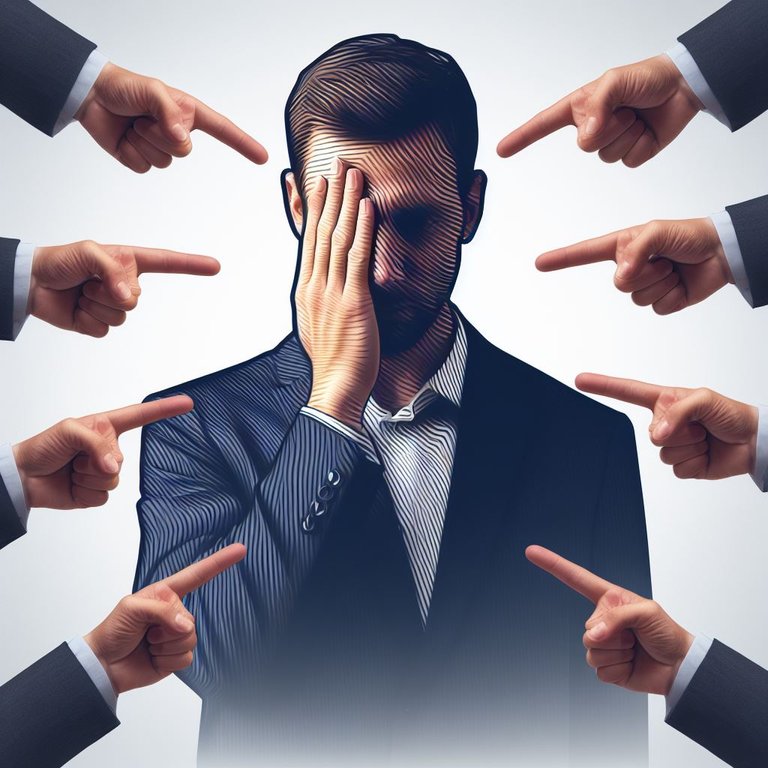
Hola a todos y a todas. Este sería mi primera publicación acá y quiero empezar agradeciendo a la comunidad @holos-lotus por la iniciativa y por tocar un tema bastante interesante y necesario.
Voy a partir de que el sufrimiento es intrínseco a la vida misma, forma parte fundamental de ella dado que nos encontramos en un mundo finito y la pérdida es, digamos, ontológica. Soy psicólogo y en mi perspectiva clínica me oriento por el psicoanálisis. En dicha práctica se reconoce a la angustia como la única que no miente y que apunta al deseo de la persona, y es precisamente la angustia la que viene a señalar aquello que falta, que no se puede nombrar. Desde que somos pequeños nos enfrentamos a muchas situaciones de pérdida: la pérdida de la comodidad de la placenta, la separación del pecho materno y muchas otras «micropérdidas» que van condicionando la forma que tendremos de soportar la vida. El sufrimiento está ahí; nos acompaña desde nuestros primeros pasos.
Ocurre que de pequeños nuestros miedos y temores son más genuinos y menos elaborados porque nuestro mundo es más concreto y aun no alcanzamos la madurez necesaria dada por la socialización y la apropiación de la cultura, para darle un significado como lo haríamos de grandes. De igual forma, en esta etapa contamos con la protección de los adultos más importantes, quienes canalizan de alguna forma nuestras ansiedades. Sin embargo, a medida que vamos creciendo, nos van influyendo una serie de elementos contextuales como la familia, los amigos, la escuela, la comunidad y demás, que van a impactar en la forma en que manejamos el sufrimiento ahora, de la vida adulta.

Dicho sufrimiento ya no es tan genuino e irreflexivo como en la infancia, sino que ahora nos sometemos a estándares morales y mandatos sociales que nos dicen qué está bien sufrir y qué no, y de qué forma. Harto conocido es el sufrimiento ante la muerte de un ser querido y la sociedad espera que nos desboquemos en llanto y desolación, y sin embargo hay muchas formas de sufrir una pérdida y de sobrellevar un duelo sin que esto signifique que la persona no siente nada.
Por otro lado -y siendo la cuestión más controversial en mi criterio-, vivimos en una sociedad con ritmos agitados, acostumbrada a lo efímero, lo momentáneo, una sociedad que premia y vende una falsa positividad porque es una sociedad consumista que intenta mantener una fuerza de trabajo emocionalmente productiva en detrimento de la individualidad de cada uno, y por ende, es una sociedad que nos anula como seres sintientes. Es por eso que nos venden la felicidad en todo: en el helado que te compras, en la ropa que vistes, en el partido que promulgan. Es por eso que constantemente nos bombardean con ideas que más que beneficiarnos, nos cargan de presión porque encima que la estamos pasando mal por algo, no se nos permite sufrir por ello.

Es así que diariamente nos topamos con la idea predominante de que el sufrimiento es una decisión, pero, ¿nos hemos detenido a pensar si quiera un segundo sobre lo que ello implica? Si sufrir es voluntario, entonces quienes sufren son los únicos culpables de hacerlo. Es necesario atender la cuestión ética que hay detrás de ello porque igualmente pudiésemos preguntarnos: ¿la víctima de un robo es culpable de que le hayan robado? Aunque es cierto que acá estamos hablando del sufrimiento por coyunturas de la vida, todo sufrimiento es igual de válido sin importar las causas, porque la única persona que conoce la profundidad del dolor, es única y exclusivamente quien sufre. Nadie tiene el derecho de manipular ni de juzgar el dolor ajeno basándose en estándares propios.
Por otro lado sufrir no es una decisión como creen muchos porque nadie controla lo que le pasa, nadie controla el impacto que ello tiene en uno mismo y nadie simplemente puede decir: «ok, después de este café pararé de sufrir». No somos máquinas como nos han hecho creer, y adivinen qué, tampoco somos los seres autosuficientes que no dependen de nada ni de nadie. No señoras y señores, somos seres sociales por naturaleza, y eso quiere decir que el entorno juega un papel fundamental tanto en la creación de la autovaloración y autoestima, como en su regulación.
Los invito a pensar en las personas con depresión clínica, no las que han tenido un mal día, sino las que de verdad necesitan psicoterapia y en muchas ocasiones, hasta psicofármacos. ¿Qué profesional psi se atrevería a decirle a una de estas personas, que está sufriendo porque quiere? ¿Acaso una persona de verdad querría sufrir a propósito? Piensen en eso un momento. ¿De verdad creen que las personas con conductas suicidas quieren morir? ¿Se imaginan si alguien le dijese algo así a una de estas personas con depresión? Además de sufrir por dicho padecimiento, esa persona se sentiría el doble de incapaz porque si dejar de sufrir es tan sencillo, ¿entonces por qué no puede? Les acabo de ilustrar un ejemplo algo extremo, pero que se puede extrapolar a la cotidianidad.
También ocurre que la misma sociedad agitada que premia lo efímero, nos ha hecho ser incapaces de lidiar con el dolor ajeno, y por eso siempre estamos diciendo: «no llores», «no estés triste», «no es para tanto», «ya se te pasará» y frases por el estilo que lo que hacen es anularnos y reprimirnos para mantener satisfechos a los demás. Ahora recuerdo un diálogo de una película española titulada Loco por Ella. Parafraseándolo sería: «lo difícil de saber que alguien está mal, es que la gente quiere que te comportes como si no lo estuvieras».

Por último, el dolor, el sufrimiento, no necesariamente tienen que ser negativos. Cuando aceptamos nuestro sufrimiento nos estamos validando como personas. Aceptar nuestro sufrimiento es conocernos más a nosotros mismos, saber dónde están nuestros límites, qué queremos y qué no, estamos sintiendo en la carne que somos personas y no autómatas que deciden no sufrir reprimir el sufrimiento que a la larga, tiene una repercusión sintomática en el cuerpo. Sufrir es un acto de respeto para con uno mismo, es saber que tenemos el derecho de estar mal por lo que sea que nos duela y que es absolutamente válido como cualquier otro dolor porque nadie es capaz de sentir en carne propia lo que nosotros sentimos, y por tanto, nadie tiene el derecho a decirnos que sufrimos porque queremos.
Así que piénsalo dos veces antes de decirle a alguien que no esté triste o que el sufrimiento es una decisión. No solo no estarás respetando lo que esa persona siente, sino que también te habrás convertido en un emisario de los convencionalismos sociales que se repiten y se repiten sin siquiera pensar en qué sentido tienen o qué consiguen.
English version

Hello to all of you. This would be my first post here and I want to start by thanking the @holos-lotus community for the initiative and for touching on a very interesting and necessary topic.
I will start from the premise that suffering is intrinsic to life itself, it is a fundamental part of it since we are in a finite world and loss is, let's say, ontological. I am a psychologist and in my clinical perspective I am guided by psychoanalysis. In this practice, anguish is recognized as the only one that does not lie and that points to the person's desire, and it is precisely anguish that points to that which is missing, that which cannot be named. From the time we are small we face many situations of loss: the loss of the comfort of the placenta, the separation from the mother's breast and many other "micro-losses" that condition the way we will have to endure life. Suffering is there; it accompanies us from our first steps.
It happens that when we are small our fears and apprehensions are more genuine and less elaborated because our world is more concrete and we have not yet reached the necessary maturity given by socialization and the appropriation of culture, to give it a meaning as we would do when we grow up. Likewise, at this stage we count on the protection of the most important adults, who channel our anxieties in some way. However, as we grow up, we are influenced by a series of contextual elements such as family, friends, school, community and others, which will have an impact on the way we handle the suffering of adult life.

Such suffering is no longer as genuine and thoughtless as in childhood, but we now submit to moral standards and social mandates that tell us what is okay to suffer and what is not, and in what way. Suffering at the death of a loved one is well known and society expects us to burst into tears and desolation, and yet there are many ways to suffer a loss and to cope with grief without this meaning that the person feels nothing.
On the other hand -and being the most controversial issue in my opinion-, we live in a society with hectic rhythms, accustomed to the ephemeral, the momentary, a society that rewards and sells a false positivity because it is a consumerist society that tries to maintain an emotionally productive workforce to the detriment of the individuality of each one, and therefore, it is a society that annuls us as sentient beings. That is why they sell us happiness in everything: in the ice cream you buy, in the clothes you wear, in the party they promulgate. That's why we are constantly bombarded with ideas that rather than benefiting us, they put us under pressure because when we are having a bad time because of something, we are not allowed to suffer for it.

Thus, every day we come across the predominant idea that suffering is a decision, but have we stopped to think for even a second about what it implies? If suffering is voluntary, then those who suffer are the only ones guilty of doing so. It is necessary to address the ethical issue behind it because we could also ask ourselves: is the victim of a robbery guilty of having been robbed? Although it is true that here we are talking about suffering due to life circumstances, all suffering is equally valid regardless of the causes, because the only person who knows the depth of pain is only and exclusively the one who suffers. No one has the right to manipulate or judge the pain of others based on their own standards.
On the other hand suffering is not a decision as many believe because no one controls what happens to them, no one controls the impact it has on oneself and no one can simply say: "ok, after this coffee I will stop suffering". We are not machines as we have been led to believe, and guess what, neither are we the self-sufficient beings that do not depend on anything or anyone. No ladies and gentlemen, we are social beings by nature, and that means that the environment plays a fundamental role both in the creation of self-worth and self-esteem, as well as in its regulation.
I invite you to think about people with clinical depression, not those who have had a bad day, but those who really need psychotherapy and in many occasions, even psychotropic drugs. What psi professional would dare to tell one of these people that he or she is suffering because he or she wants to? Would a person really want to suffer on purpose? Think about it for a moment, do you really think that people with suicidal behavior want to die? Can you imagine if someone said something like that to one of these people with depression? In addition to suffering from such a condition, that person would feel twice as helpless because if stopping suffering is so easy, then why can't they? I have just illustrated a somewhat extreme example, but one that can be extrapolated to everyday life.
It also happens that the same agitated society that rewards the ephemeral, has made us incapable of dealing with the pain of others, and that is why we are always saying: "don't cry", "don't be sad", "it's not that bad", "it will pass" and phrases like that that what they do is to annul and repress us to keep others satisfied. Now I remember a dialogue from a Spanish movie called Loco por Ella. Paraphrasing it would be: "the hard thing about knowing that someone is bad, is that people want you to behave as if you were not".

Finally, pain, suffering, does not necessarily have to be negative. When we accept our suffering we are validating ourselves as people. To accept our suffering is to know ourselves better, to know where our limits are, what we want and what we don't want, we are feeling in the flesh that we are people and not automatons that decide not to suffer, to repress the suffering that in the long run, has a symptomatic repercussion in the body. Suffering is an act of respect for oneself, it is knowing that we have the right to feel bad for whatever it is that hurts us and that it is absolutely valid as any other pain because no one is capable of feeling in the flesh what we feel, and therefore, no one has the right to tell us that we suffer because we want to.
So think twice before telling someone not to be sad or that suffering is a choice. Not only will you not be respecting what that person feels, but you will also have become an emissary of social conventions that are repeated and repeated without even thinking about what sense they make or what they achieve.

Créditos | Credits
Imágenes utilizadas | Images used:
Todas las imágenes son de mi propiedad y fueron generadas con la IA de Bing Image Creator | All images are my own and were generated with Bing Image Creator AI.
Traducción | Translation:
DeepL
Saludos @genrigp. Bienvenido a la Comunidad @Holos-lotus. Qué gran aporte nos ofreces con tu publicación. Ya que muchos confirmamos que el sufrimiento es por decisión. Y también pienso que es así, todos tenemos emociones y sentimientos genuinos y cada quien los expresa o vive de acuerdo a su personalidad. Pero cada quien es responsable de cómo gestionar esos sentires, como también si sufre ante una adversidad o toma la mejor actitud para afrontarla. Qué bueno contar con la opinión de un especialista en psicología.
De acuerdo, también es cierto que tenemos parte de responsabilidad en cómo gestionar el sufrimiento. Hay quienes se lo tragan, hay quienes lo expresan visceralmente, hay quienes deciden ir a un especialista, y hay quienes simplemente deciden revolcarse en dicho sufrimiento. Eso está en dependencia de cada uno de nosotros y en cómo afrontemos la vida. Pero soy partidario de que únicamente cuando algo así represente un problema o afecte ya sea a otra persona o a uno mismo, es cuando debemos tomar una decisión, pero no la de dejar de sufrir, sino la de hacer algo con eso. Mientras tanto son procesos de la vida que no hay que violentar.
Gracias por leerme y por comentar algo tan valioso. Aquí estaré para futuras reflexiones 😊. Saludos.
Excelente este post, comparto totalmente tu perspectiva, ojalá muchas personas se pasen por aquí a leer porque es de esas cosas que si todos leyeran y entendieran haría del mundo un lugar un poquito más amable.
Gracias por tan lindo comentario ☺️
Congratulations @genrigp! You have completed the following achievement on the Hive blockchain And have been rewarded with New badge(s)
Your next target is to reach 4250 upvotes.
You can view your badges on your board and compare yourself to others in the Ranking
If you no longer want to receive notifications, reply to this comment with the word
STOPMuy buena reflexión. También creo que los estándares de la sociedad actual fomenta el miedo a la muerte y al sufrimiento ( una vision falsa y superficial de lo que es "normal"). Una actuación negacionista que no nos prepara para afrontar la pérdida y nos impide valorar lo que tenemos, compulsandonos a estar siempre corriendo tras lo que no tenemos.
Excelente observación, estoy de acuerdo. Muchas gracias por llegarse y leer 😊.
🤗
Muy buena reflexión. También creo que los estándares de la sociedad actual fomenta el miedo a la muerte y al sufrimiento ( una vision falsa y superficial de lo que es "normal"). Una actuación negacionista que no nos prepara para afrontar la pérdida y nos impide valorar lo que tenemos, compulsandonos a estar siempre corriendo tras lo que no tenemos.